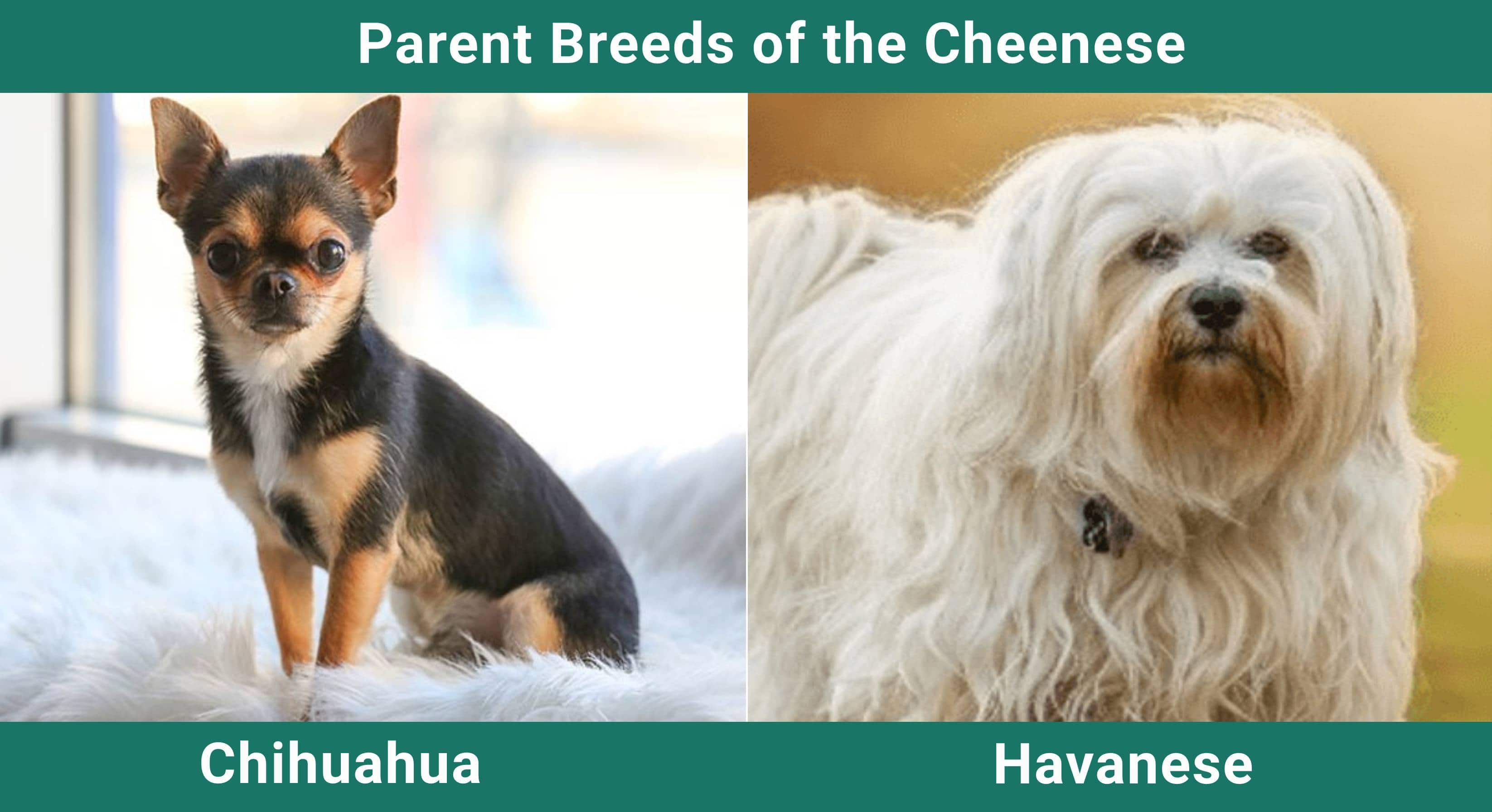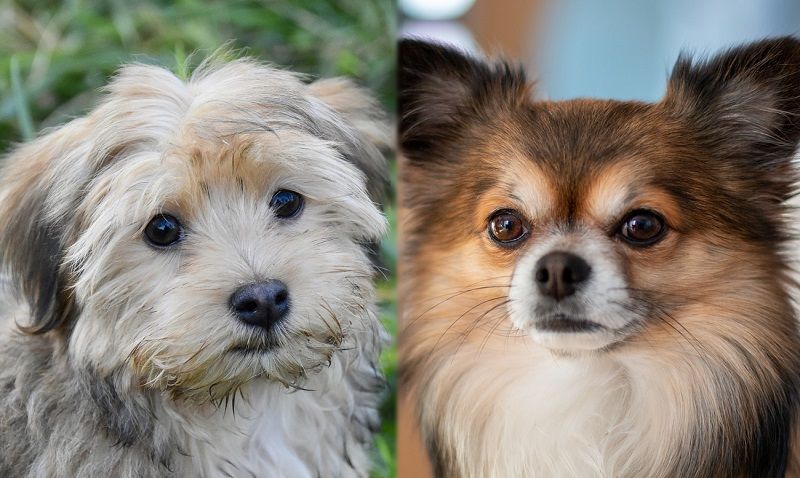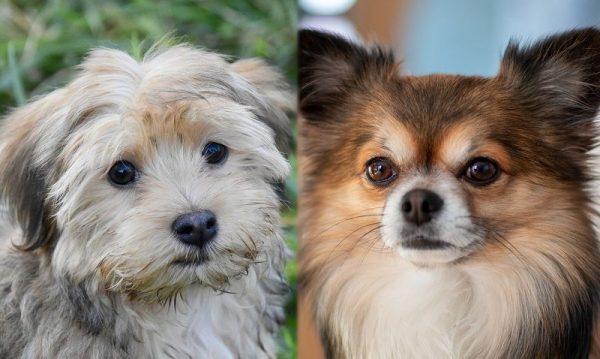Click Below to Skip Ahead
A cross between a Havanese and a Chihuahua, the Cheenese has been growing in popularity over recent years due to their adorable looks and loyal nature.
Breed Overview
Height:
6 – 9 inches
Weight:
4 – 16 pounds
Lifespan:
12 – 18 years
Colors:
Brown, gold, white, black, chocolate, and cream
Suitable for:
People without small children, those in small living spaces, those with other pets
Temperament:
Independent, stubborn, social, and loyal
Still, what all goes into these adorable pups, and what do you need to take care of them?
From pricing, temperament, and even common health issues, we break down everything that you need to know here. This way, you can decide if a Cheenese is right for you and have a better understanding of everything that goes into caring for and training these pups!
Cheenese Characteristics
Cheenese Puppies
There are many things to love about the Cheenese. They have an extremely long lifespan and get along with other dogs and pets. But they can be a bit of a mixed bag.
The Cheenese can have a few health problems, they’re notoriously stubborn and difficult to train, and they don’t do well around small children. Still, if you’re an experienced pet owner who’s up for a bit of a challenge, the payoff is huge.
You will get a small pup that is great in small apartments, has an extremely long lifespan, and has enough energy to provide entertainment at a dog park or even just around the block! Make sure to read the Cheenese’s full care guide to know what your pup needs to grow into a happy and healthy dog.

Temperament & Intelligence of the Cheenese
Don’t confuse a Cheenese’s stubbornness with a lack of intelligence. On the contrary, these dogs are extremely smart and enjoy mental stimulation through various toys.
However, while Cheenese is independent and can be playful, they don’t do well with smaller children. This is primarily because of their independent streak, as they don’t want to deal with a small child with a strong will of their own.
That said, these dogs are incredibly loyal to their owners. While they might not want to listen to you throughout the day, they’ll still respond strongly to you and will favor you over anyone else who comes into your home.
Are These Dogs Good for Families?
While the Cheenese is good with other pets and in small apartments, you shouldn’t mistake them for a good family dog. The Cheenese can tolerate older children, but due to their small size, stubbornness, and a touch of jealousy, we do not recommend adopting a Cheenese if you have small children.
Also, keep in mind that these pups have a longer lifespan, so if you think that kids might be in your future, you should probably opt for a different breed.
But if you don’t want more children or if your kids are already older, a Cheenese can make a great addition to your family.
Does This Breed Get Along With Other Pets?
While a Cheenese doesn’t get along well with small children, they usually get along great with other pets. Early socialization is vital, though, so if you have an older Cheenese that hasn’t been around other animals, you might have problems introducing a new pet into the home.
Remember that the Cheenese is a smaller dog. So, if you have a larger dog that’s a bit clumsy or energetic, they can hurt the smaller Cheenese even when they’re not trying to!
Things to Know When Owning a Cheenese
Before you adopt or purchase a Cheenese, it’s best to know exactly what you’re getting into. That’s why we broke down everything that you need to know about caring for a Cheenese here.
Food & Diet Requirements
Since the size of a Cheenese can vary quite a bit, their dietary requirements can change too. You’ll need to feed your Cheenese anywhere from ½ cup to 1 cup of high-quality dry dog food a day.
This is on the lower side of things because the Cheenese is a small dog. Be sure that you don’t skimp on the quality of the food, or you’re asking for more health concerns down the road.
Exercise
Despite their smaller size, a Cheenese has a moderate level of energy. If you live in an apartment, you’ll need to take them out for multiple walks per day, and they’ll enjoy a few trips out to the dog park, where they can run around without their leash.
If you have a yard, they’ll enjoy the open space, but be sure to get them out on walks and introduce them to other animals. If you don’t exercise a Cheenese enough, they can exhibit destructive boredom behaviors that can be both frustrating and costly.
Training
If you’re a first-time pet owner, you might struggle to train a Cheenese. These dogs are notoriously stubborn, and even housebreaking them can be challenging. If you don’t have what it takes to train them, we recommend taking them to a professional pet trainer but keep in mind that this will cost you even more money.
Consistency and persistence are essential to training these pups, as it often comes down to a battle of wills — and they’re a strong-willed adversary.
Grooming ✂️
If your Cheenese takes after their Chihuahua parent, they’ll be moderate shedders that require daily brushing. If they take after their Havanese parent, they likely won’t shed at all, but they’ll still require near-daily brushing to keep their hair from matting.
No matter which parent they take after, you will need to give them a bath about once a month with a high-quality shampoo. The wrong shampoo can lead to skin problems, so don’t skimp on the product, and don’t over-bathe your dog, as this can lead to problems too.
Finally, brush a Cheenese’s teeth at least three to four times a week to prevent plaque buildup. It can save you hundreds, if not thousands, of dollars in vet bills down the road.
Health and Conditions
While many people prefer designer breeds because they tend to be healthier than purebreds, with a Cheenese, that’s simply not the case. They are genetically susceptible to a wide host of problems, including hypoglycemia, collapsed tracheas, patellar luxation, and eye problems.
- Eye problems
- Deafness
- Hypoglycemia
- Collapsed trachea
- Hydrocephalus
- Patellar luxation
- Liver problems
The best thing that you can do for your Cheenese is to take care of them properly, keep them on a healthy diet, and ensure that they’re getting yearly checkups with the vet and following all of their recommended advice.
While this won’t prevent all problems, it will reduce the chances of them developing health concerns early in life. We also recommend purchasing pet insurance for your Cheenese, as this will help offset any costs if they do develop a severe condition in the future.
Male vs. Female
Like most dogs, male Cheenese pups tend to be a little larger than females and more attention-dependent. So, if you’re looking for a dog that wants extra love and attention, opt for a male, but if you’re looking for one that doesn’t need to be on your lap every second of every day, choose a female.
Also, keep in mind that females are slightly more expensive to spay than what it costs to neuter a male. While this isn’t a huge difference, it’s something that you should be aware of if you’re on a tight budget.
3 Little-Known Facts About the Cheenese
1. Cheenese Dogs Can Be Hypoallergenic
Your Cheenese dog being hypoallergenic is pretty much a 50/50 chance. If they take after their Chihuahua lineage, they will not be hypoallergenic. However, if they take after their Havanese parentage, they will be.
2. Despite Their Small Size, Cheenese Dogs Need Moderate Levels of Activity
Just because a Cheenese is a great apartment dog doesn’t mean that they don’t have the energy to burn. You still need to take them out for walks, and they’ll love the occasional trip to the dog park.
3. Despite Being Independent Cheenese Dogs Love Being a Lap Dog
The Cheenese is fiercely independent and stubborn, but they’re still going to want to curl up on your lap for most of the day. Since it’s what they want to do, it doesn’t conflict with their independent nature.
Final Thoughts
The Cheenese is a cute dog, but they’re far from the easiest pets out there to take care of. Still, if you can train and socialize them, they’re great companions with long lifespans and can fit into the smallest of apartments or the largest of farms.
So, before you adopt a Cheenese, know what you’re getting into, and be sure that you can handle it because the last thing that you want to do is rehome a dog that’s already bonded with you!
- See Also: Golden Havanese (Havanese & Golden Retriever Mix): Pictures, Care Guide, Temperament and Traits
Featured Image Credit: Left – JACLOU-DL, Pixabay; Right – HG-Fotografie, Pixabay








